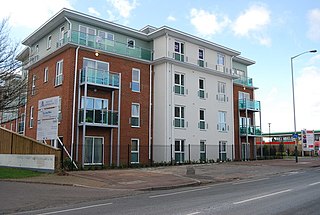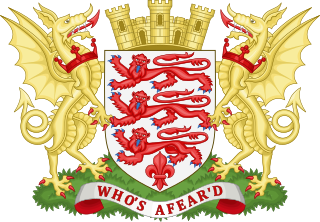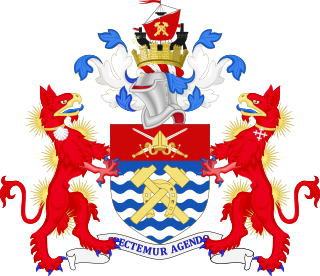Related Research Articles

Construction is a general term meaning the art and science of forming objects, systems, or organizations. It comes from the Latin word constructio and Old French construction. To 'construct' is a verb: the act of building, and the noun is construction: how something is built or the nature of its structure.

In Ireland and the United Kingdom, housing associations are private, non-profit making organisations that provide low-cost "social housing" for people in need of a home. Any budget surplus is used to maintain existing housing and to help finance new homes and it cannot be used for personal benefit of directors or shareholders. Although independent, they are regulated by the state and commonly receive public funding. They are now the United Kingdom's major providers of new housing for rent, while many also run shared ownership schemes to help those who cannot afford to buy a home outright.

Local government in Scotland comprises thirty-two local authorities, commonly referred to as councils. Each council provides public services, including education, social care, waste management, libraries and planning. Councils receive the majority of their funding from the Scottish Government, but operate independently and are accountable to their local electorates. Councils raise additional income via the Council Tax, a locally variable domestic property tax, and Business rates, a non-domestic property tax.
The Office for National Statistics is the executive office of the UK Statistics Authority, a non-ministerial department which reports directly to the UK Parliament.

The United Kingdom Local Government Act 1988 is an Act of the United Kingdom Parliament. It was famous for its controversial section 28. This section prohibited local authorities from promoting, in a specified category of schools, "the teaching of the acceptability of homosexuality as a pretended family relationship".
The Information Services Procurement Library (ISPL) is a best practice library for the management of Information Technology related acquisition processes. It helps both the customer and supplier organization to achieve the desired quality using the corresponded amount of time and money by providing methods and best practices for risk management, contract management, and planning. ISPL focuses on the relationship between the customer and supplier organization: It helps constructing the request for proposal, it helps constructing the contract and delivery plan according to the project situation and risks, and it helps monitoring the delivery phase. ISPL is a unique Information Technology method because where most other Information Technology methods and frameworks focus on development, ISPL focuses purely on the procurement of information services. The target audience for ISPL consists of procurement managers, acquisition managers, programme managers, contract managers, facilities managers, service level managers, and project managers in the IT area. Because of ISPL's focus on procurement it is very suitable to be used with ITIL and PRINCE2.
DLO can refer to:

Knowledge Intensive Business Services are services and business operations heavily reliant on professional knowledge. They are mainly concerned with providing knowledge-intensive support for the business processes of other organizations. As a result, their employment structures are heavily weighted towards scientists, engineers, and other experts. It is common to distinguish between T-KIBS,, and P-KIBS, who are more traditional professional services - legal, accountancy, and many management consultancy and marketing services. These services either supply products which are themselves primary sources of information and knowledge, or use their specialist knowledge to produce services which facilitate their clients own activities. Consequently, KIBS usually have other businesses as their main clients, though the public sector and sometimes voluntary organisations can be important customers, and to some extent households will feature as consumers of, for instance, legal and accountancy services.
Best Value was government policy in the United Kingdom affecting the provision of public services in England. In Wales, Best Value is known as the Wales Programme for Improvement. A statutory duty of Best Value also applies in Scotland.
Enterprise plc was a support services company originally based in Farington in Lancashire, England. Its core markets were local authorities and utility sectors. It has recently been integrated into Ferrovial's UK company, Amey plc.
Industrial marketing or business-to-business marketing is the marketing of goods and services by one business to another. Industrial goods are those an industry uses to produce an end product from one or more raw material. The term industrial marketing has largely been replaced by the term business-to-business marketing (B2B).
Government procurement or public procurement is undertaken by the public authorities of the European Union (EU) and its member states in order to award contracts for public works and for the purchase of goods and services in accordance with principles derived from the Treaties of the European Union. Such procurement represents 13.6% of EU GDP as of March 2023, and has been the subject of increasing European regulation since the 1970s because of its importance to the European single market.

Dorset County Council (DCC) was the county council for the county of Dorset in England. It provided the upper tier of local government, below which were district councils, and town and parish councils. The county council had 46 elected councillors and was based at County Hall in Dorchester. The council was abolished on 31 March 2019 as part of structural changes to local government in Dorset.

Newham London Borough Council also known as Newham Council, is the local authority for the London Borough of Newham in Greater London, England. It is a London borough council, one of 32 in London. The council has been under Labour majority control since 1971. It has been led by a directly elected mayor since 2002. The council meets at Newham Town Hall in East Ham and has its main offices at 1000 Dockside Road, overlooking the Royal Albert Dock.

Mouchel Group, originally known as L. G. Mouchel & Partners Ltd, was an infrastructure and business services company headquartered in Woking, United Kingdom. It provided advisory, design, project delivery and managed services associated with infrastructure and business services across the highways and transportation, local government, emergency services, property, health, education and utility markets across the world.
Updata Infrastructure UK Ltd was a privately held UK company providing Internet and broadband connectivity services, primarily to public sector markets. Updata’s headquarters were in Premier House, Reigate, Surrey and the company also had offices in Wales and Scotland.

Hammersmith and Fulham London Borough Council, which styles itself Hammersmith and Fulham Council, is the local authority for the London Borough of Hammersmith and Fulham in Greater London, England. It is a London borough council, one of 32 in London. The council has been under Labour majority control since 2014. The council's usual meeting place is at Hammersmith Town Hall.
At around £290 billion every year, public sector procurement accounts for around a third of all public expenditure in the UK. EU-based laws continue to apply to government procurement: procurement is governed by the Public Contracts Regulations 2015, Part 3 of the Small Business, Enterprise and Employment Act 2015, and the Public Contracts (Scotland) Regulations of 2015 and 2016. These regulations implement EU law, which applied in the UK prior to Brexit, and also contain rules known as the "Lord Young Rules" promoting access for small and medium enterprise (SMEs) to public sector contracts, based on Lord Young's Review Growing Your Business, published in 2013.

The Local Government Act 1999 is an Act of Parliament in the United Kingdom, applicable to a wide range of local authorities in England and Wales. It was promoted by a Labour government, in the first years of the First Blair ministry, and was described, in 2000, as "arguably most significant local government legislation for a decade".
References
- 1 2 McCabe, J., The DLO dilemma: the choice between outsourcing repairs or doing them in-house, Inside Housing, published on 15 March 2023, accessed on 4 October 2024
- 1 2 3 Department for Communities and Local Government, Annex G: Glossary of terms and acronyms, Archived 2012-04-05 at the Wayback Machine ,
- ↑ http://www.icevirtuallibrary.com/docserver/fulltext/abvitbe.27886.bm03.pdf?expires=1336578967&id=id&accname=guest&checksum=DEA607E99EA177B15387231E04BCBBDA, ICE
- ↑ Data Sources and Definitions: Public Sector Employment - Background Notes, Scottish Government
- ↑ SocietyGuardian, The Guardian
- ↑ http://www.cipfa.org.uk/thejournal/download/jour_vol5_no2_c.pdf Archived 2010-12-24 at the Wayback Machine Cost Saving Through Competitive Tendering: The Case of Refuse Collection Revisited, Tonge, Richard & Willett, Caroline, University of Portsmouth, CIPFA
- 1 2 Austin Mayhead and Company Limited, CCT and Local Authority Blue Collar Services, research for the Department of Transport, Local Government and the Regions published in March 1997, archived on 10 June 2009, accessed on 5 October 2024